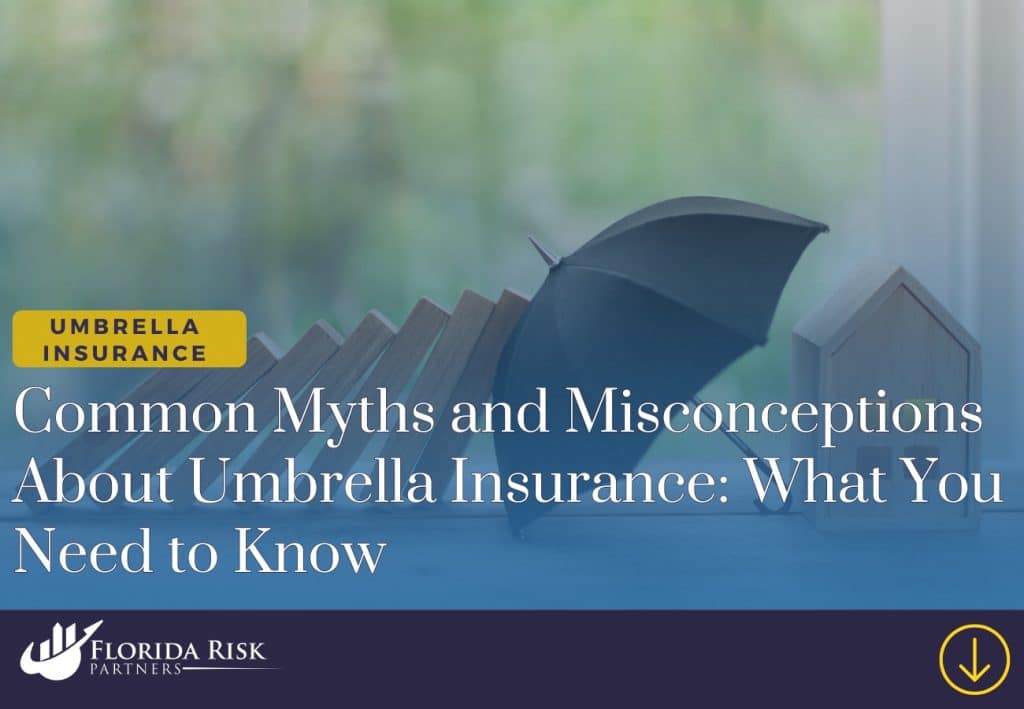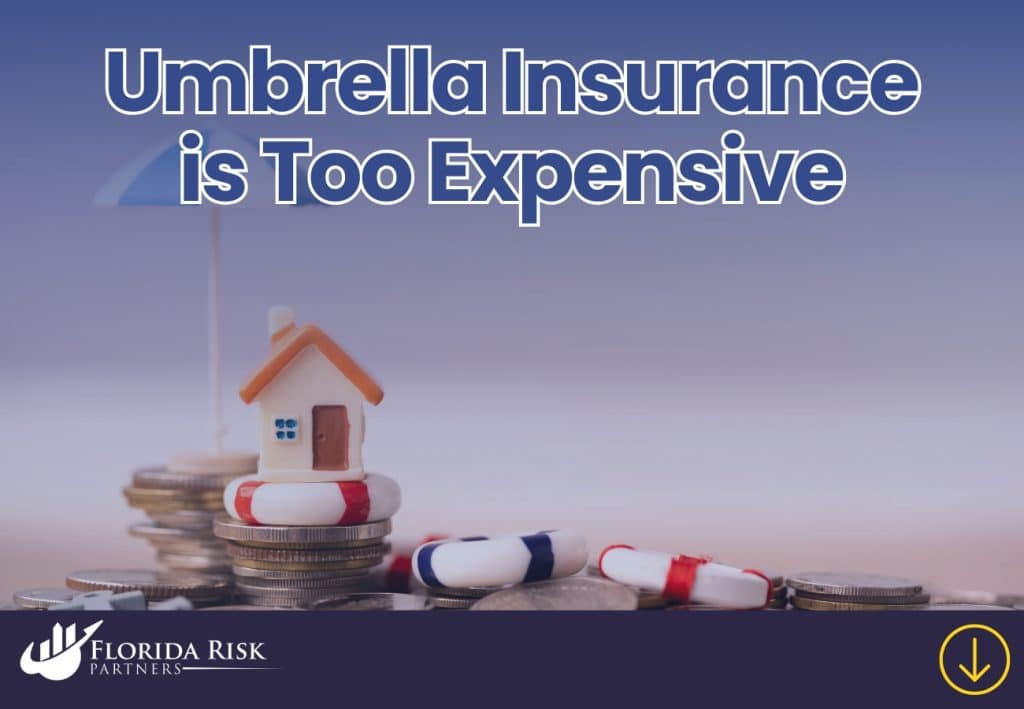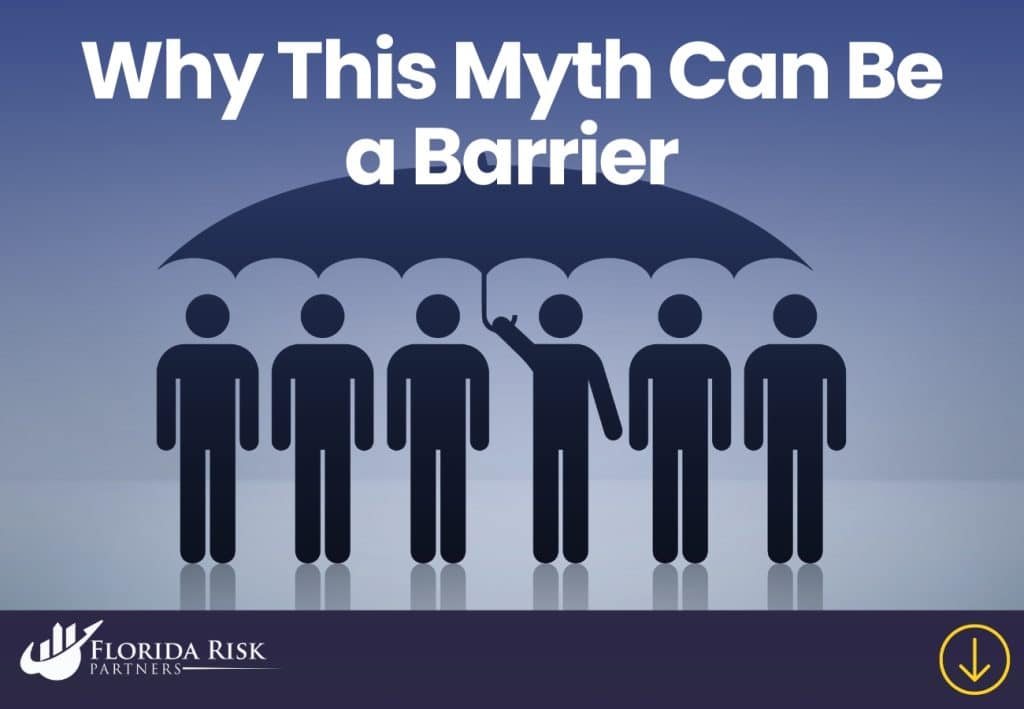-
Main Office: 1434 E. Bloomingdale Ave Valrico, FL 33596-6110
-
Phone: (888) 601-6660
-
Email: info@floridariskpartners.com

When it comes to personal umbrella insurance, there are many myths and misconceptions that can lead people to overlook this valuable coverage. Often thought of as an “extra” or something that only the wealthy need, umbrella insurance is actually an essential layer of financial protection for many people, providing coverage beyond the limits of standard policies like homeowners and auto insurance. Misunderstandings about who needs umbrella insurance, how it works, and what it covers can prevent people from making informed decisions about their insurance needs.
This post debunks common myths about umbrella insurance, highlighting its benefits, affordability, and broad protection. Understanding the truth reveals how it safeguards your assets, future earnings, and financial peace of mind. Umbrella insurance is an essential tool for comprehensive liability coverage.
Myth 1: Umbrella Insurance is Only for the Wealthy
A common myth about umbrella insurance is that it’s only for the wealthy. While individuals with high-value assets benefit greatly, this misconception overlooks its importance for everyone. Middle-income families and young professionals with assets to protect also gain significant value from umbrella insurance.
Why This Myth is Misleading
Umbrella insurance is designed to protect both current assets and future income from major claims and lawsuits. If you’re involved in a serious accident or face a liability claim that exceeds your primary insurance limits, your assets and even future income can be at risk. A court could order wage garnishment or the liquidation of assets to satisfy a judgment, putting your financial future in jeopardy.
The Truth: Umbrella insurance isn’t just for the wealthy; it’s for anyone with assets, a home, a car, or future income to protect. For a relatively low premium, umbrella insurance provides high levels of coverage, making it a valuable investment for a wide range of people, not just the ultra-wealthy.
Myth 2: My Standard Homeowners or Auto Insurance is Sufficient
Another common misconception is that homeowners and auto insurance policies provide enough liability coverage for most situations. While these policies do offer liability protection, they often fall short in covering high-cost claims or lawsuits. Most homeowners policies, for instance, offer liability limits ranging from $100,000 to $500,000, while auto policies often max out around similar levels. While these limits may sound high, they can quickly be exhausted in a severe accident or lawsuit.
Why This Myth Can Lead to Financial Vulnerability
In cases involving serious injuries, property damage, or multi-party claims, the liability limits of standard policies may not cover all expenses, leaving you to pay the difference out of pocket. For example, a major car accident involving multiple people can result in medical bills and legal fees that far exceed the limits of an auto policy.
The Truth: Standard homeowners and auto insurance policies are often insufficient to cover large liability claims. Umbrella insurance provides an extra layer of protection that kicks in when your primary policies are maxed out, ensuring you’re not left with a substantial financial burden.
Myth 3: Umbrella Insurance is Too Expensive
Many people assume that umbrella insurance is costly, especially given the high coverage limits it offers. However, this couldn’t be further from the truth. Umbrella insurance is one of the most affordable types of insurance available, especially considering the level of protection it provides. For a few hundred dollars per year, you can obtain $1 million in coverage, with each additional million costing around $75 to $100 more.

Why This Myth is Harmful
Believing that this insurance is expensive prevents people from exploring a coverage option that could save them from financial disaster in the event of a major liability claim. For many, the low cost of umbrella insurance is well worth the protection it provides.
The Truth: Umbrella insurance is affordable and offers great value, with $1 million coverage costing under $300 annually. It’s a cost-effective way to safeguard your assets and future earnings from significant claims.
Myth 4: Umbrella Insurance Only Covers Rare, Unlikely Events
Another myth about umbrella insurance is that it’s only useful for rare, unlikely events. While umbrella insurance does cover unique liability claims, such as slander or defamation, it also provides protection in more common situations that can lead to high-cost claims.
Examples of Common Situations Covered by Umbrella Insurance
- Multi-Vehicle Car Accidents: If you’re involved in a serious car accident with multiple vehicles and injuries, the medical bills and damages could easily exceed your auto insurance limits.
- Guest Injuries on Your Property: If a guest is injured at your home and sues you for medical costs and lost wages, your homeowners policy may not provide enough coverage.
- Personal Injury Claims: Umbrella insurance covers claims for personal injury, such as defamation or invasion of privacy, which are increasingly common in today’s digital world.
The Truth: Umbrella insurance covers both rare and common events that can lead to substantial liability claims. It’s a practical form of protection for everyday risks as well as unique circumstances.
Myth 5: Umbrella Insurance Covers Everything
On the flip side, some people mistakenly believe that umbrella insurance provides universal coverage, protecting against all types of claims. While umbrella insurance does offer broad protection, it doesn’t cover everything. Like all insurance policies, umbrella insurance has exclusions and limitations.
Common Exclusions in Umbrella Insurance Policies
- Intentional Acts: Umbrella insurance won’t cover damages or injuries that you cause intentionally.
- Business-Related Claims: Personal umbrella insurance does not cover business liabilities. If you own a business, you’ll need a commercial umbrella policy for business-related claims.
- Certain Vehicles: Some policies exclude specific types of vehicles, such as aircraft or high-value watercraft, unless you have additional coverage.
- Workers’ Compensation Claims: Claims related to employees or household staff, such as nannies or housekeepers, are not covered by umbrella insurance.
The Truth: While umbrella insurance provides extensive liability protection, it doesn’t cover every scenario. Understanding its exclusions helps you determine if additional coverage is necessary to fully protect yourself.
Myth 6: Umbrella Insurance is Complicated to Obtain
Some people avoid umbrella insurance because they assume it’s complicated or difficult to add to their existing coverage. In reality, obtaining umbrella insurance is a straightforward process, especially if you already have homeowners or auto insurance with a provider.
Why This Myth Can Be a Barrier
Believing that this insurance is difficult to obtain keeps people from exploring this valuable coverage. In most cases, adding umbrella insurance to your existing policies is as simple as contacting your insurance provider and meeting the minimum liability requirements.
The Truth: Adding this insurance is easy, especially if you bundle it with existing policies. Most insurance agents can provide a quote within minutes, and many insurers offer discounts for bundling policies, making it an accessible and convenient option.

Myth 7: Umbrella Insurance Covers Physical Damage to Your Property
Many assume umbrella insurance covers physical property damage like a roof or car. However, it’s strictly a liability policy. Umbrella insurance protects against claims for injuries or damage you cause to others.
What Umbrella Insurance Really Covers
- Bodily Injury Liability: Covers medical expenses, lost wages, and other damages if you’re responsible for someone else’s injury.
- Property Damage Liability: Covers the cost of damage to someone else’s property, such as their car or home, for which you’re liable.
- Personal Injury Claims: Covers claims for defamation, slander, libel, and other non-physical injuries.
The Truth: Umbrella insurance does not cover physical damage to your property. Instead, it covers your liability for causing injury or damage to others, providing an extra layer of protection beyond your standard policies.
Myth 8: Umbrella Insurance is Unnecessary if You Don’t Have Significant Assets
Many think umbrella insurance isn’t needed without high net worth, but that’s untrue. It protects both current assets and future income. A large liability claim could result in wage garnishment, jeopardizing your financial future.
Why This Myth is Limiting
By assuming umbrella insurance is only for people with substantial wealth, many individuals miss out on critical protection for their future earning potential. For young professionals or those with high earning potential, umbrella insurance is an affordable way to safeguard income and maintain financial stability.
The Truth: Umbrella insurance is valuable for anyone with earning potential or assets to protect, not just those with high net worth. It protects both current and future income, making it a worthwhile investment for people in various financial situations.
Myth 9: Umbrella Insurance Only Covers Large, Catastrophic Claims
Another misconception is that this insurance is only useful for covering large, catastrophic claims. While it’s true that umbrella insurance covers major liability claims, it’s also helpful in a variety of situations that might not seem catastrophic but still carry significant costs.
Examples of Scenarios Covered by Umbrella Insurance
- Defamation or Slander Lawsuits: Even a single social media post could lead to a defamation claim. Umbrella insurance would cover legal costs and settlements in such cases.
- Guest Injuries at Your Home: If a guest falls and sustains serious injuries, the liability costs could be substantial, even if the incident doesn’t seem catastrophic.
- Pet-Related Injuries: Dog bites or other pet-related incidents can lead to expensive liability claims, especially if multiple parties are involved.
The Truth: Umbrella insurance covers a range of liability scenarios, from everyday incidents to large claims, making it a versatile and valuable form of protection.
Final Thoughts: Don’t Let Myths Keep You From Valuable Protection
Misunderstanding umbrella insurance stops people from using its extensive protection. This insurance offers affordable, essential liability coverage that extends beyond standard policy limits, making it a valuable addition.
If you’re interested in learning more about how this insurance can protect you and your family, download our free e-book for a comprehensive guide on umbrella insurance coverage, real-life scenarios, and tips on choosing the right policy.
Get a FREE copy of our comprehensive guide to personal umbrella insurance
Understanding the truth about umbrella insurance myths helps you make informed decisions about liability coverage. It’s not just for the wealthy or rare events—it’s a practical solution. Umbrella insurance offers peace of mind and financial security for anyone seeking extra protection.
Call Us Or
Schedule an Appointment
Select an agent below to view our online calendars and select a day and time that works best for you or call us directly at 888-601-6660. When you use our online calendars, you will receive an email with more information.



